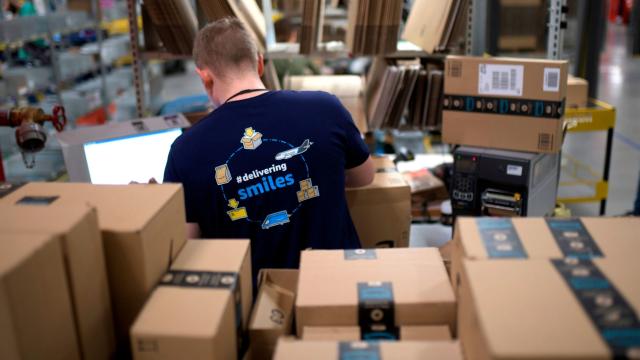The Trump administration is adopting a tougher stance to combat the multi-billion dollar market of selling counterfeit goods on online platforms like Amazon, per a U.S. Department of Homeland Security report released Friday.
Among 11 “immediate actions” outlined, the report calls for a federal committee to help identify the key players in counterfeit networks online as well as additional legislation to allow “the government to seek injunctive relief against third-party marketplaces and other intermediaries dealing in counterfeit merchandise.”
By “third-party marketplace” here, they’re referring to any online platform where sellers unaffiliated with the site are open to hawk their wares, which covers everything from sites openly advertising themselves as second-hand marketplaces like eBay to platforms that also heavily deal in in-house products like Amazon and Wal-Mart.
Launching a national consumer awareness campaign, adopting harsher penalties for repeat offenders, and applying a wider range of deterrents like civil fines and injunctive actions were among 11 “immediate actions” the DHS outlined in Friday’s report.
The anti-fraud campaign follows a “phase one” agreement with China the president signed last week, wherein both world leaders committed to “combat the prevalence of counterfeit or pirated goods” when online platforms fall short.
As they have for many, many years now. A recent Organisation for Economic Cooperation and Development (OECD) study the report cites estimated that international sales of online counterfeits rose from $US200 ($293) billion in 2005 to more than $US500 ($733) billion in 2016, an overall 154 per cent increase. While Amazon is hardly the only culprit, its struggles with curbing all the fake crap sold on its platform have received significant attention in part because many of those counterfeit items were later found to be just plain dangerous. An investigation by the Wall Street Journal last year discovered more than 4,000 products “declared unsafe by federal agencies, are deceptively labelled or are banned by federal regulators” being sold on the platform, including products marketed for infants such as sleeping mats and toys.
(Oh, and of course, let’s not forget that America’s Commander-in-Chief also just really hates the company’s CEO, Jeff Bozo Bezos. Which could also account for some of that increased federal scrutiny.)
Amazon told Gizmodo that it welcomes the added support and review outlined in the department’s report. To date, it’s invested $US400 ($586) million in fraud protection strategies and routinely works with brands and law enforcement to crack down on bad actors selling counterfeit goods, the company added.
“Amazon’s anti-counterfeiting efforts are best in class but we recognise they are not perfect and will continue to innovate and work with policymakers and law enforcement to protect brands and customers,” an Amazon spokeswoman said via an emailed company statement.
The DHS’s report also outlines 10 best practices for these e-commerce platforms and third-party marketplaces to adopt as part of this initiative. Proposed strategies include beefing up third-party vetting, streamlining the processes for brands to log complaints, and improving response time for kicking counterfeit items off their platform once they’ve been flagged.
As more than two-thirds of the counterfeit and pirated products seized by the U.S. Customs and Border Protection come from China and Hong Kong, the report continues, the DHS also urged these platforms to adopt stricter policies to better keep foreign sellers accountable and protect consumers, such as requiring multiple forms of identification and proof of insurance in case of damages.
It all indicates Trump’s trying to make good on his call to “clean up this Wild West of counterfeiting and trafficking,” as White House adviser Peter Navarro put it back in April. Then, the president made his first call for a crackdown on the illegal online marketplaces amid ordering additional studies concerning how to more effectively track and hamper these sales.
